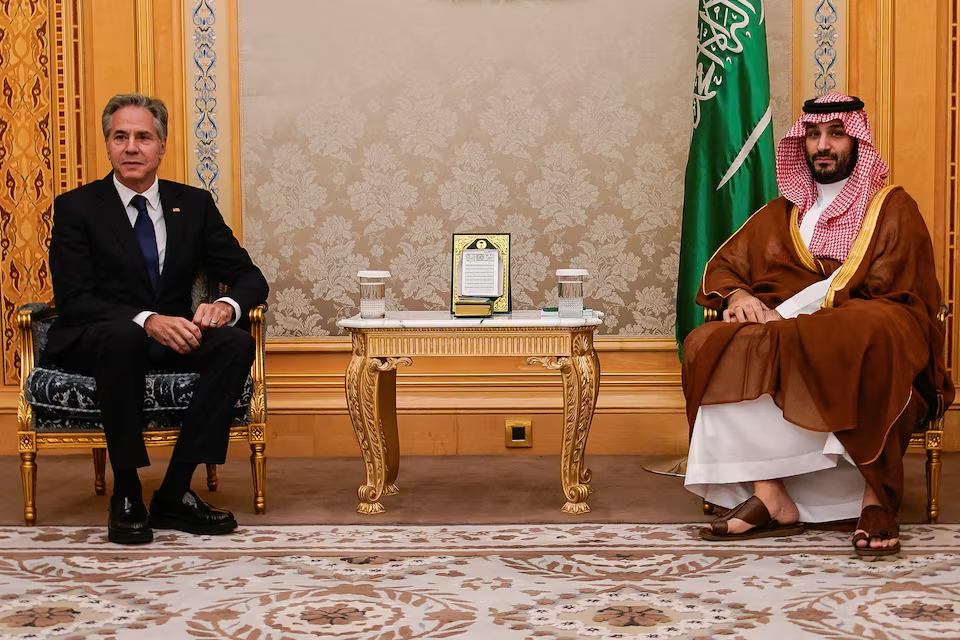Saudi Arabia has shifted its focus from pursuing a full-fledged defense treaty with the United States to seeking a more modest military cooperation agreement, according to multiple Saudi and Western officials. This pivot comes amid heightened public outrage in Saudi Arabia and the broader Middle East over Israel’s military actions in Gaza, further complicating efforts to normalize relations between Saudi Arabia and Israel.
Earlier this year, Saudi Crown Prince Mohammed bin Salman softened the kingdom’s stance on Palestinian statehood, signaling that a public commitment from Israel to a two-state solution could pave the way for normalization. However, following Israel’s Gaza offensive, Riyadh has reinstated its condition that Israel take concrete steps toward establishing a Palestinian state as a prerequisite for normalization.
Scaled-Back Security Agreement in the Works
While the kingdom initially sought a sweeping mutual defense treaty requiring U.S. forces to protect Saudi Arabia in the event of an attack, discussions have shifted to a scaled-down agreement. The proposed deal focuses on enhanced military cooperation, including joint exercises, U.S. logistical support, cybersecurity collaboration, and increased Saudi investment in advanced technologies like drone defense. A Patriot missile battalion may also be deployed to bolster Saudi missile defense capabilities.
Unlike the comprehensive treaties the U.S. maintains with Japan or South Korea, the new agreement would not obligate U.S. forces to defend Saudi Arabia directly. It would also aim to curb Saudi collaboration with China by fostering partnerships with U.S. defense firms.
Normalization on Hold Amid Domestic and Regional Pressures
Israeli Prime Minister Benjamin Netanyahu remains eager to secure normalization with Saudi Arabia, seeing it as a historic achievement. However, he faces domestic opposition to making any concessions to the Palestinians, particularly from his ruling coalition. Similarly, Crown Prince Mohammed must navigate domestic and regional backlash, with Saudi officials calling Israel’s actions in Gaza “collective genocide” during an Arab and Islamic summit in Riyadh.
Publicly, Saudi Arabia insists that the creation of a Palestinian state, with East Jerusalem as its capital, is an essential condition for long-term peace and stability in the region. Diplomats suggest that normalization talks could resume in the future, possibly under a different Israeli government or once tensions in Gaza subside.
The Trump Factor and Regional Dynamics
Further complicating the situation is the potential return of Donald Trump to the White House. Trump’s prior “Deal of the Century” excluded provisions for Palestinian sovereignty and allowed Israel to annex parts of the West Bank, a plan widely seen as undermining the two-state solution. Diplomats speculate that Trump could leverage promises of a Gaza ceasefire or vague support for a Palestinian state to secure normalization between Saudi Arabia and Israel without requiring significant Israeli concessions.
Broader Implications
A defense agreement, even in its scaled-back form, would bind Saudi Arabia more closely to the U.S. at a time when China is making strategic inroads in the Middle East. It would also strengthen Saudi Arabia’s defenses against regional threats, including Iran and its Houthi allies.
As negotiations continue, Saudi Arabia’s leadership faces the challenge of balancing its security priorities with its longstanding advocacy for Palestinian statehood. Whether under President Biden or a potential Trump administration, the evolving dynamics will define the region’s geopolitical landscape and the future of the Israeli-Palestinian peace process.



